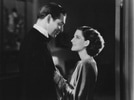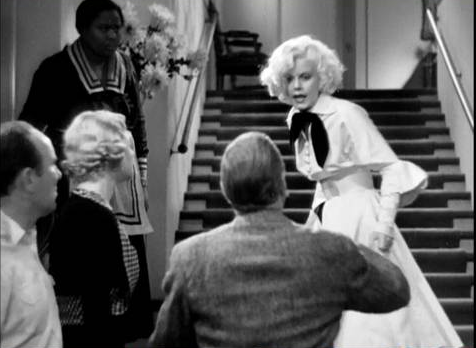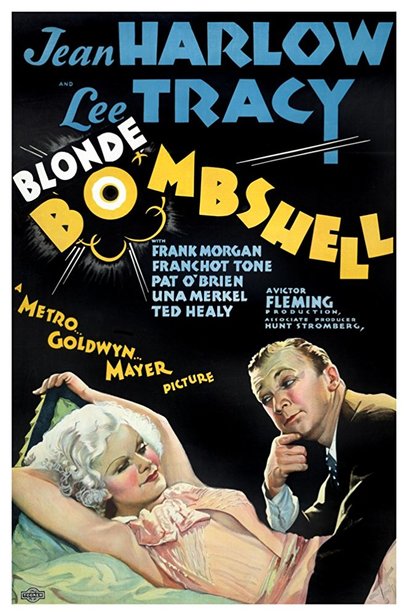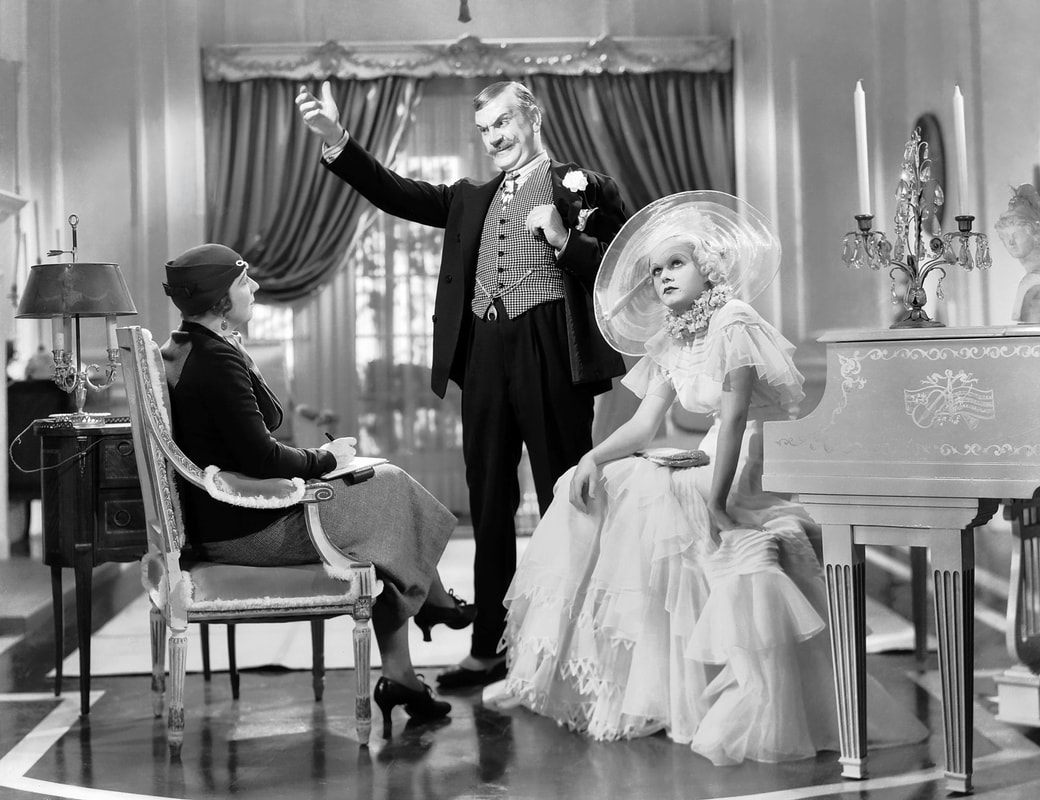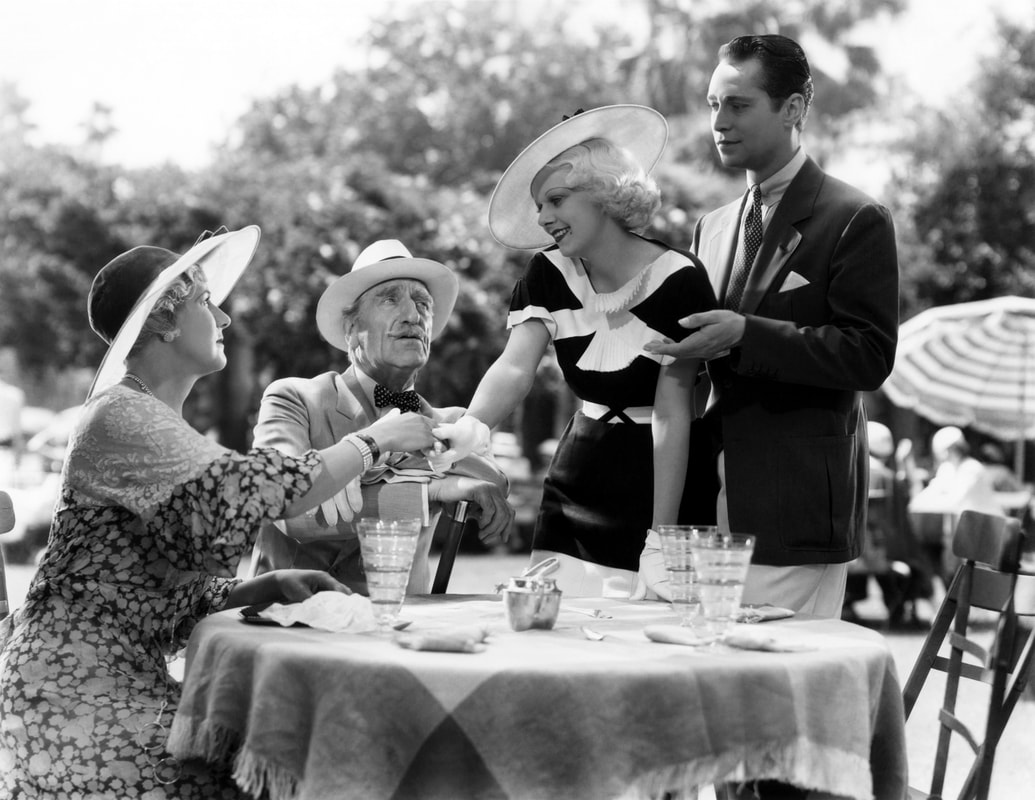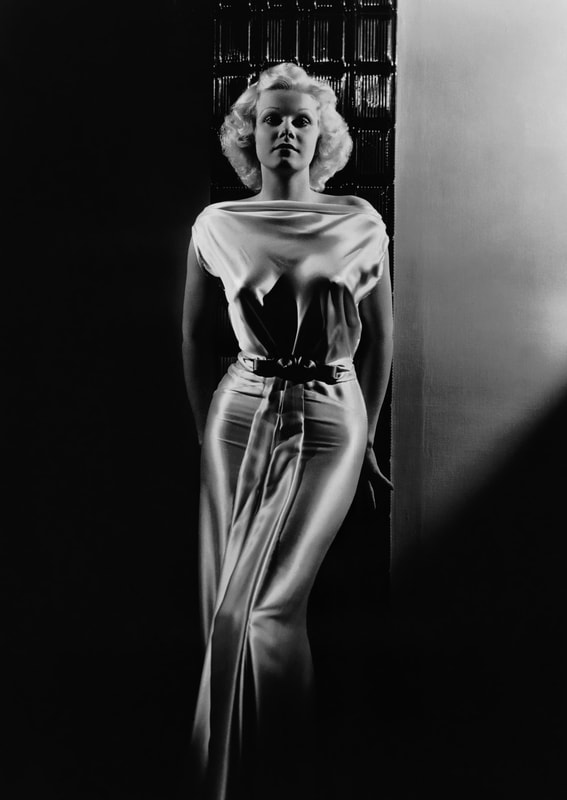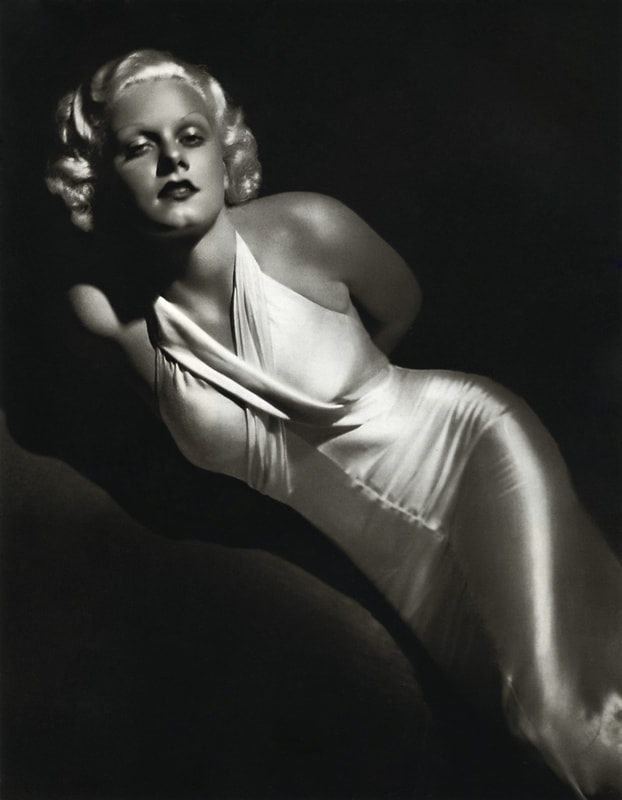Plot:
Lola Burns (Harlow) is a movie star of the highest order. Her picture is plastered on every magazine cover, she is mobbed by autograph seekers everywhere she goes & she is hounded by ‘yes’ men willing to promise her anything. She also has a family that exploits her at every turn, taking her earning for their own misguided adventures. She does, however, have a subservient butler named Winters (Leonard Carey) & a very understanding personal maid Loretta (Louise Beavers who do what they can to keep her sane. Unfortunately, the man at the center of the chaos is none other than Monarch studio PR man Space Hanlon (Tracy), who just happens to believe that all publicity is good publicity. He has no qualms about putting his stars, including Lola, into bad situations if it means a front page headline. Because his feelings for Lola only complicates matters he exposes Lola’s current lover, the Marquis Hugo (Lebedeff), as an act of revenge and when Lola finds out she leaves Hollywood promising never to work in film again! At a desert resort, however, she meets Gifford Middleton, a Boston Blueblood who falls madly in love with her over the course of 1 day. With only Gifford’s parents approval between Lola and wedded bliss, Hanlon descends on the resort to ‘protect’ Lola…and the studios investment! The truth about the Middleton family is discovered & Lola rolls away, fighting with Hanlon & vowing to never work in Hollywood again.
Lola Burns (Harlow) is a movie star of the highest order. Her picture is plastered on every magazine cover, she is mobbed by autograph seekers everywhere she goes & she is hounded by ‘yes’ men willing to promise her anything. She also has a family that exploits her at every turn, taking her earning for their own misguided adventures. She does, however, have a subservient butler named Winters (Leonard Carey) & a very understanding personal maid Loretta (Louise Beavers who do what they can to keep her sane. Unfortunately, the man at the center of the chaos is none other than Monarch studio PR man Space Hanlon (Tracy), who just happens to believe that all publicity is good publicity. He has no qualms about putting his stars, including Lola, into bad situations if it means a front page headline. Because his feelings for Lola only complicates matters he exposes Lola’s current lover, the Marquis Hugo (Lebedeff), as an act of revenge and when Lola finds out she leaves Hollywood promising never to work in film again! At a desert resort, however, she meets Gifford Middleton, a Boston Blueblood who falls madly in love with her over the course of 1 day. With only Gifford’s parents approval between Lola and wedded bliss, Hanlon descends on the resort to ‘protect’ Lola…and the studios investment! The truth about the Middleton family is discovered & Lola rolls away, fighting with Hanlon & vowing to never work in Hollywood again.
Thoughts:
Bombshell is a wonderful peak behind the 1930’s Hollywood curtain, showing how “talent” was perceived by the public and treated by the studios. Glamorous on the surface, but a morass of contracts, hangers on, dictatorial bosses and manipulative press men, 1930’s Hollywood was a sometimes not too pleasant experience for the stars. The fact that screenwriters John Lee Mahin (Red Dust, Wife v. Secretary) & Jules Furthman (Mutiny on the Bounty, Big Sleep, To Have & Have Not) got away with such an over representation is somewhat amazing. It’s rather cynical look at the life of a movie star is very telling in many respects, but no more so that in the parallels between Harlow’s real life and that of Lola Burns.
Lola is Hollywood’s “If” girl, an obvious parallel to Clara Bow’s late ‘20’s “It” girl & reflective of an open sexuality and promiscuity flouted by Hollywood and propagated in industry supported fan magazines. (Bows love of dogs is even captured for comedic effect in Lola’s 3 oversized and intrusive sheep dogs.) Just as Lola has a blood sucking family, playing every angle to use & abuse her money, so too did Harlow. Martino Bello, Harlow’s mothers 2nd husband was famous around Hollywood for exploiting his proximity to Harlow. Whether romancing young starlets on studio grounds or courting investors for get rich quick schemes with a promises of Harlow’s involvement, Bello was a master manipulator and exploiter. Morgan’s Pop Burns, on the other hand, is a cartoonish version of Bello, but he clearly has the same exploitive desires to rob his daughter blind. While Bello mixed his thieving with a heavy dose of philandering, Pop Burns seems to laughingly only interested in taking money, although the repeated allusion to horse ‘breeding’ can have subtle sexual overtones that cannot be overlooked.
Similarly, Harlow shared a house with her extended family throughout her career. Even while ensconced at Paul Bern’s house during her brief marriage to the MGM producer, she was staying with her mother the night he killed himself & would often retreat there if it were convenient. The mayhem at Lola’s house again seems to be a caricature of life in the Harlow’s home, but there seem to be subtle truths exaggerated in Bombshell. The party thrown by Mac (Merkel) and Lola’s surprise discovery, certainly mirrored or exaggerated the abuse of Harlow’s funds by her family & various hangers on.
While many of these parallels may have been missed by ‘30’s audiences only familiar with the studio created myth of Harlow’s life, many throw away lines & overt plot points were taken directly from Harlow’s career and public life. My favorite is the scene when she walks on set, at first pleasantly greeting the stage hands and technicians, a common Harlow trait, only to turn venomous towards her director complaining, “Don’t think I’m gonna get in that rain barrel again if the water is cold!” a sly nod to the famous nude scene from Red Dust with Clark Gable. Lola, like Harlow, clearly bristled against her constant type casting & limited roles. Lola, channeling Harlow, even voices her concern that she’s “tired of playing the same roles” as a reason to give up Hollywood for good & “I generally play more experience roles” to refute the con of her playing Alice in Wonderland and acknowledge her sexual charged performances & persona.
Where I feel Bombshell’s cynicism shows is the constant manipulation of Lola by Space Hanlon, representing the studio as the driving force not just in the career of its stars, but in the fabric of their being. The studio can make or break stars on a whim, protect them from scandal or expose them to ridicule if the mood or opportunity arises. For me the most disturbing is the line from a reporter questioning Lola’s proposed adoption, “maybe it’s her kid she had farmed out for a while” reflecting a practice of young unwed starlets secretly giving up their babies for adoption, only to ‘adopt’ them later to save face (The most famous case is probably Loretta Young’s ‘adoption’ of her daughter fathered by Clark Gable). It’s a throwaway line in Bombshell, but very reflective of the dark underside of studio politics. Similar passages against motherhood showcase the cold facts of studio attitudes towards its contract players. “I don’t want my bombshell turned into a rubber nipple” & “you can’t raise a family & make 5 pictures a year” are telling, but the perfect indictment of studio hypocrisy is Hanlon’s line “Lola Burns can’t have a baby, it’s not in her contract” confirming the studio as sole arbiter of a player’s life.
Bombshell is a wonderful comedy on the foibles of the Hollywood stardom and a great showcase for Harlow. Its dark underside was most likely only minimally apparent to contemporary viewers and it’s theatrical release, at the height of the pre-code era, surely exploited the salacious nature of Harlow’s persona at the expense of the insider commentary. Harlow’s gift for comic timing, her ability to make fun of herself and her willingness to flaunt her sexuality in the most natural ways combine to make Bombshell of her best.
Bombshell is a wonderful peak behind the 1930’s Hollywood curtain, showing how “talent” was perceived by the public and treated by the studios. Glamorous on the surface, but a morass of contracts, hangers on, dictatorial bosses and manipulative press men, 1930’s Hollywood was a sometimes not too pleasant experience for the stars. The fact that screenwriters John Lee Mahin (Red Dust, Wife v. Secretary) & Jules Furthman (Mutiny on the Bounty, Big Sleep, To Have & Have Not) got away with such an over representation is somewhat amazing. It’s rather cynical look at the life of a movie star is very telling in many respects, but no more so that in the parallels between Harlow’s real life and that of Lola Burns.
Lola is Hollywood’s “If” girl, an obvious parallel to Clara Bow’s late ‘20’s “It” girl & reflective of an open sexuality and promiscuity flouted by Hollywood and propagated in industry supported fan magazines. (Bows love of dogs is even captured for comedic effect in Lola’s 3 oversized and intrusive sheep dogs.) Just as Lola has a blood sucking family, playing every angle to use & abuse her money, so too did Harlow. Martino Bello, Harlow’s mothers 2nd husband was famous around Hollywood for exploiting his proximity to Harlow. Whether romancing young starlets on studio grounds or courting investors for get rich quick schemes with a promises of Harlow’s involvement, Bello was a master manipulator and exploiter. Morgan’s Pop Burns, on the other hand, is a cartoonish version of Bello, but he clearly has the same exploitive desires to rob his daughter blind. While Bello mixed his thieving with a heavy dose of philandering, Pop Burns seems to laughingly only interested in taking money, although the repeated allusion to horse ‘breeding’ can have subtle sexual overtones that cannot be overlooked.
Similarly, Harlow shared a house with her extended family throughout her career. Even while ensconced at Paul Bern’s house during her brief marriage to the MGM producer, she was staying with her mother the night he killed himself & would often retreat there if it were convenient. The mayhem at Lola’s house again seems to be a caricature of life in the Harlow’s home, but there seem to be subtle truths exaggerated in Bombshell. The party thrown by Mac (Merkel) and Lola’s surprise discovery, certainly mirrored or exaggerated the abuse of Harlow’s funds by her family & various hangers on.
While many of these parallels may have been missed by ‘30’s audiences only familiar with the studio created myth of Harlow’s life, many throw away lines & overt plot points were taken directly from Harlow’s career and public life. My favorite is the scene when she walks on set, at first pleasantly greeting the stage hands and technicians, a common Harlow trait, only to turn venomous towards her director complaining, “Don’t think I’m gonna get in that rain barrel again if the water is cold!” a sly nod to the famous nude scene from Red Dust with Clark Gable. Lola, like Harlow, clearly bristled against her constant type casting & limited roles. Lola, channeling Harlow, even voices her concern that she’s “tired of playing the same roles” as a reason to give up Hollywood for good & “I generally play more experience roles” to refute the con of her playing Alice in Wonderland and acknowledge her sexual charged performances & persona.
Where I feel Bombshell’s cynicism shows is the constant manipulation of Lola by Space Hanlon, representing the studio as the driving force not just in the career of its stars, but in the fabric of their being. The studio can make or break stars on a whim, protect them from scandal or expose them to ridicule if the mood or opportunity arises. For me the most disturbing is the line from a reporter questioning Lola’s proposed adoption, “maybe it’s her kid she had farmed out for a while” reflecting a practice of young unwed starlets secretly giving up their babies for adoption, only to ‘adopt’ them later to save face (The most famous case is probably Loretta Young’s ‘adoption’ of her daughter fathered by Clark Gable). It’s a throwaway line in Bombshell, but very reflective of the dark underside of studio politics. Similar passages against motherhood showcase the cold facts of studio attitudes towards its contract players. “I don’t want my bombshell turned into a rubber nipple” & “you can’t raise a family & make 5 pictures a year” are telling, but the perfect indictment of studio hypocrisy is Hanlon’s line “Lola Burns can’t have a baby, it’s not in her contract” confirming the studio as sole arbiter of a player’s life.
Bombshell is a wonderful comedy on the foibles of the Hollywood stardom and a great showcase for Harlow. Its dark underside was most likely only minimally apparent to contemporary viewers and it’s theatrical release, at the height of the pre-code era, surely exploited the salacious nature of Harlow’s persona at the expense of the insider commentary. Harlow’s gift for comic timing, her ability to make fun of herself and her willingness to flaunt her sexuality in the most natural ways combine to make Bombshell of her best.
